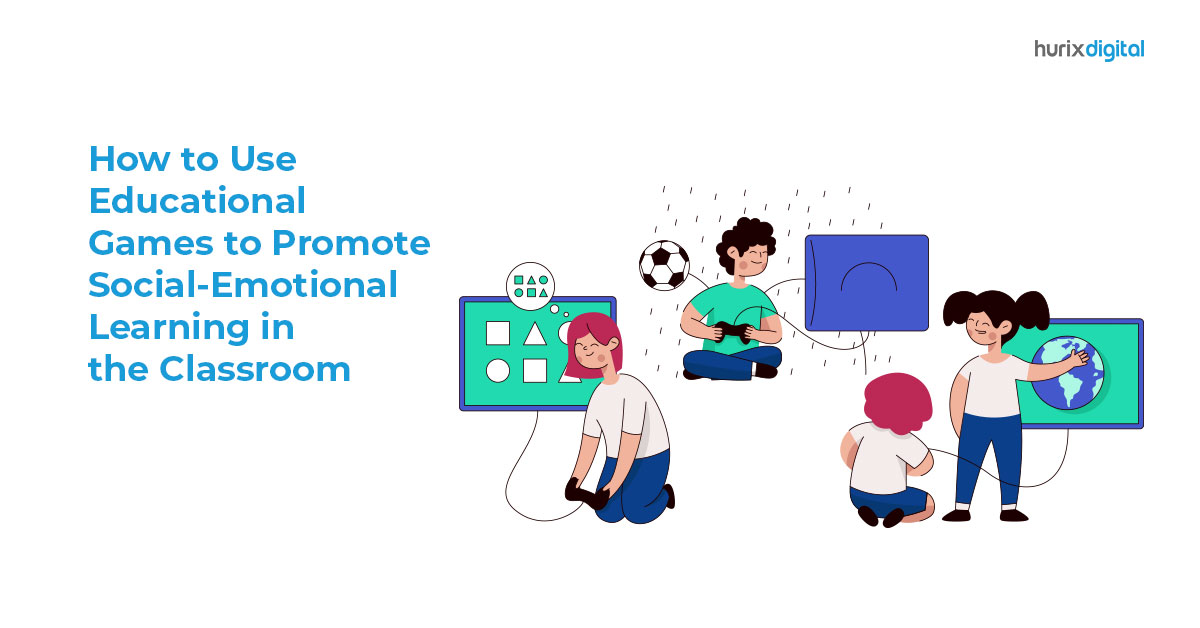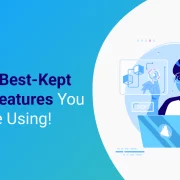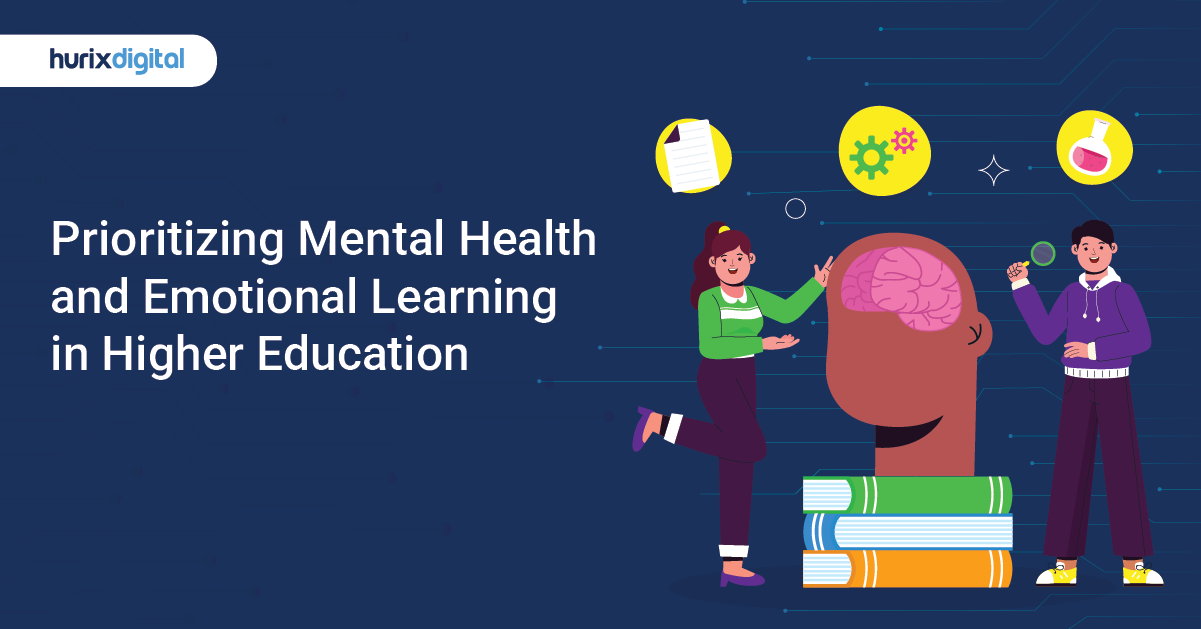
Prioritizing Mental Health and Emotional Learning in Higher Education
Mental health problems continue to increase year by year in every country. In the USA alone, 50 million adults experience a mental illness. These challenges are not limited to adults—children, adolescents, and young adults also struggle with mental health issues. Addressing these concerns early through Social Emotional Learning (SEL) can play a crucial role in fostering emotional resilience, self-awareness, and overall well-being.
According to WHO, every 1 in 7 10-19-year-olds suffers from a mental health condition. Additionally, 18-25-year-olds are the most vulnerable age group to experience mental health concerns and have the highest rate of experiencing serious mental illnesses.
Given the high proportion of mental illnesses among young adults, how exactly can you address mental health challenges?
The answer lies in social-emotional learning and other related strategies.
But before delving into them, it’s important to understand the causes and the mental health challenges higher-ed students and teachers are going through.
Table of Contents:
- Causes of Mental Health Problems Among Students and Teachers
- Common Mental Health Challenges
- Ways to Address Mental Health Challenges
- The Need for Assessing SEL in Education
- Implementing SEL Assessment and Evaluation
- Analyzing and Interpreting SEL Data
- Conclusion
Causes of Mental Health Problems Among Students and Teachers
Going to a college or university after school brings forth a period of tumultuous transition for students. While living away from home on or off campus can initially seem exciting, it can eventually turn distressing.
To top this off, completing endless assignments, taking one exam after another, carrying out society’s activities, working a part-time job, and much more can cause a lot of stress. Long-term or prolonged stress negatively impacts a student’s mental health and leads to the development of mental health illnesses.
Besides the students, even teachers can develop mental illnesses. In higher education institutions, teachers have to handle a huge workload, work long hours, conduct research and publish papers, develop engaging lesson plans, understand students’ learning styles, and so on.
This can trigger distress and cause burnout, rendering teachers vulnerable to mental health conditions.
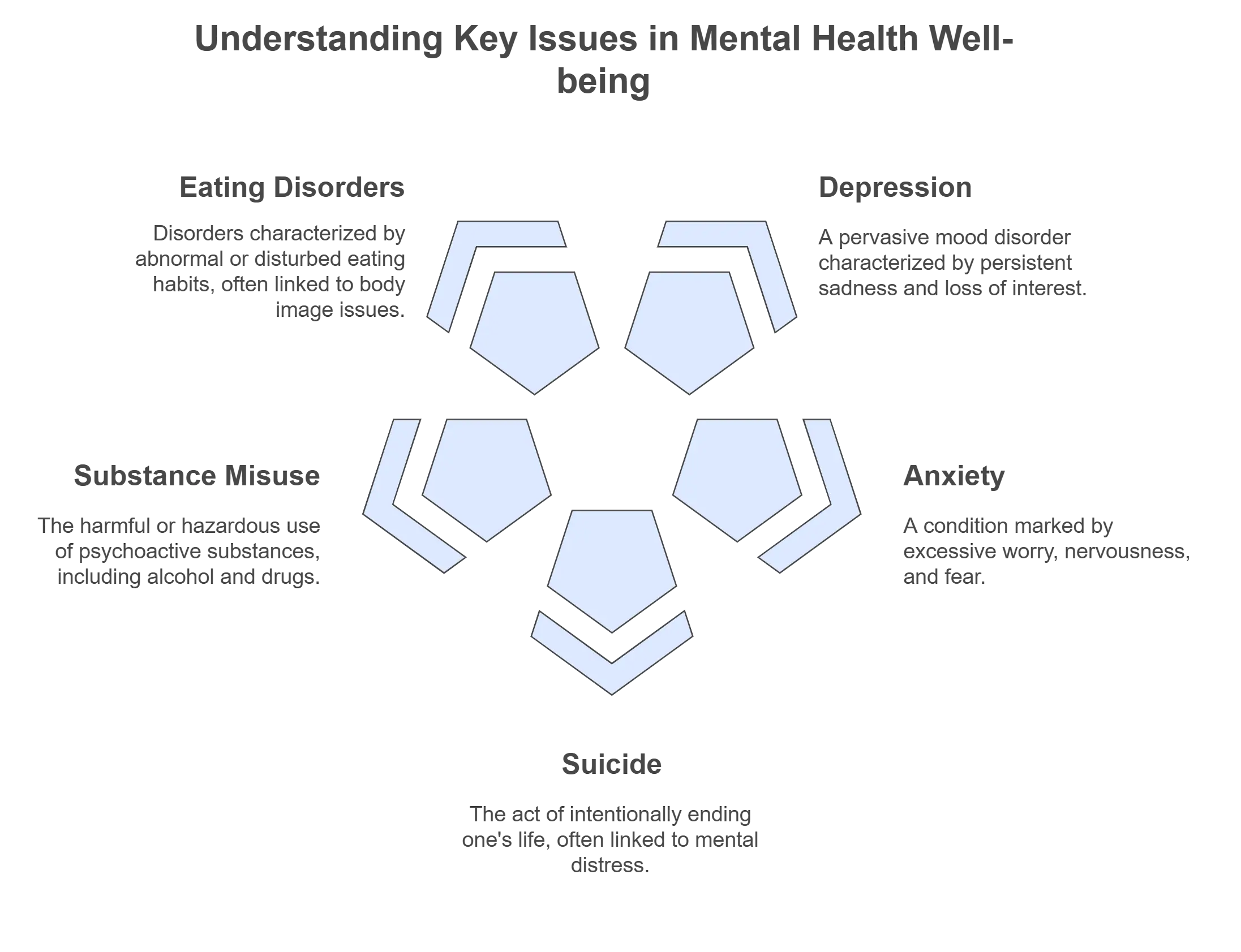
Common Mental Health Challenges
Both students and teachers are equally prone to experiencing mental health challenges. Some common mental illnesses that can plague their lives include:
1. Depression
About 21 million adults in the USA live with depression. Among them, 18-29-year-olds have the highest prevalence level at 21%, while that of 30-44-year-olds is 16.8%.
Students and teachers with depression are likely to experience symptoms such as:
- Feelings of sadness, guilt, and hopelessness
- Changes in sleep and appetite
- Withdrawal from people – social isolation
- Trouble concentrating and completing work
2. Anxiety
Every college student and teacher in a higher education institution experiences anxiety from time to time. Anxiety is normal only if it doesn’t interfere with their day-to-day functioning.
The moment it does – it can lead to the development of anxiety disorders, one of the most common illnesses affecting around 42.5 million in the USA. Some commonly occurring anxiety disorders include generalized anxiety disorder, panic disorder, and social anxiety disorder.
3. Suicide
The fourth leading cause of mortality among the ages of 15-29, suicide, includes the elements of suicidal ideation, intent, and self-harming tendencies.
Students and teachers considering suicide can show signs and symptoms like increasing absenteeism, loss of interest in activities, decreasing effort and grades, and marked personality change.
4. Substance Misuse
According to statistics, 28.320 million people in the USA live with an alcohol use disorder. Among them, 18-25-year-olds make up the highest percentage (39%) of drug users.
This high prevalence of substance misuse is brought on by reasons like wanting to forget the bad moments of the present or past, numbing the persistent troubling feelings and emotions, etc.
Overall, indulging in alcohol or drugs is a very unhealthy way of coping with stress and emotional difficulties.
5. Eating Disorders
Eating disorders like anorexia nervosa, binge eating, and bulimia nervosa are quite common among college students. These disorders involve an unhealthy concern with one’s weight and body image, resulting in starving or excessive bouts of eating followed by purging.
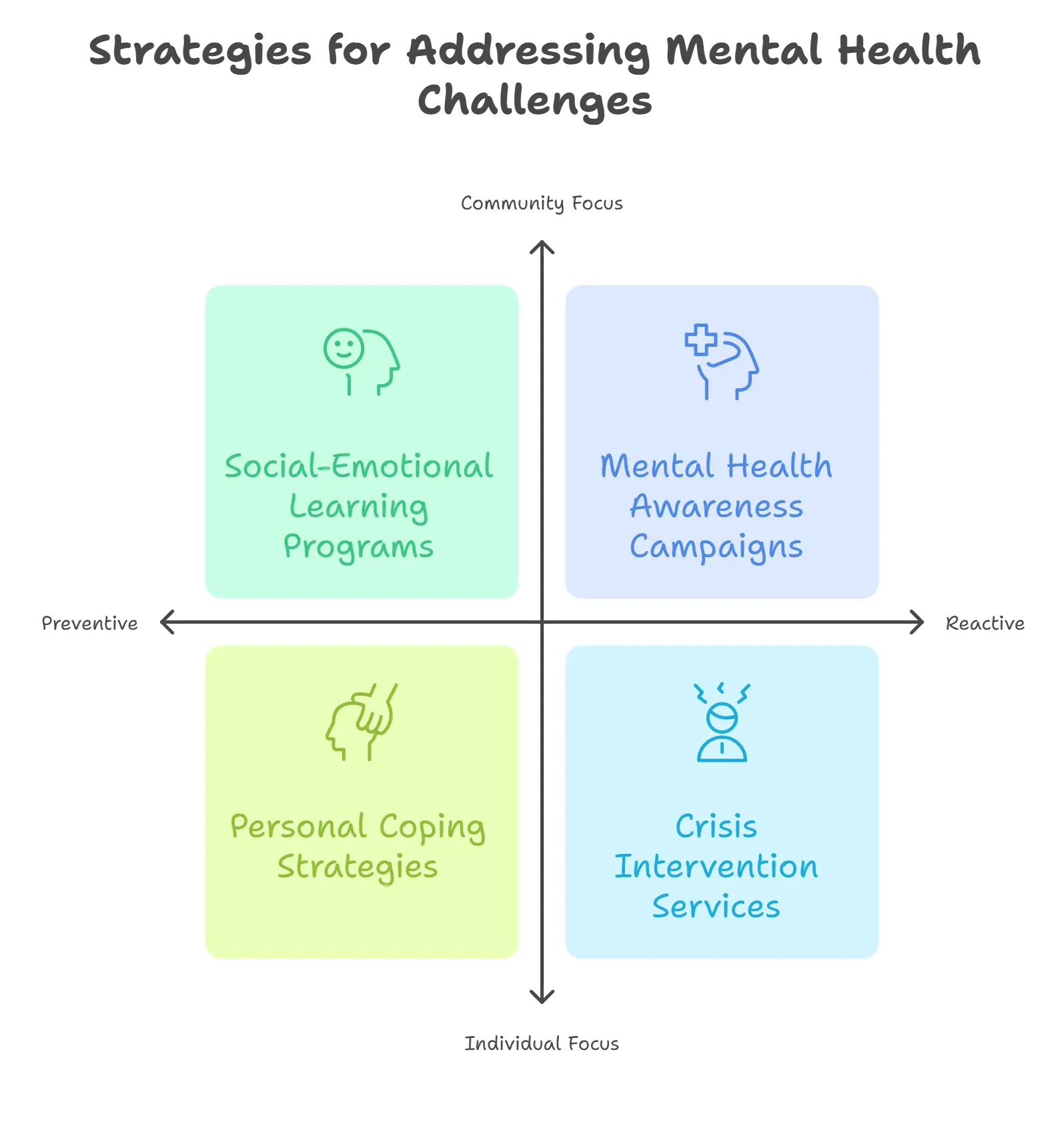
Ways to Address Mental Health Challenges
Now that you know the causal factors and mental health challenges – let’s understand how you can address and tackle them.
1. Social-Emotional Learning
Social-emotional learning (SEL) is an educational methodology that teaches social, emotional, and other related skills to help students and teachers cope better with their emotions and succeed.
The foundation of social-emotional learning is made up of five core competencies, as follows:
- Self-Awareness: Involves recognizing one’s own emotions, feelings, thoughts, behavior, strengths, and weaknesses. It leads to the creation of a positive sense of identity and image.
- Self-Management: Involves regulation and control over one’s thoughts, emotions, and behavior. It emphasizes building skills like goal setting, stress management, problem-solving, and impulse control.
- Social Awareness: Involves the ability to identify and understand others’ thoughts, emotions, and behaviors. It further involves being empathetic and respectful toward others’ cultures and values.
- Relationship Skills: Involve developing and maintaining healthy relationships with others. They further emphasized building skills like active listening, effective communication, conflict resolution, etc.
- Responsible Decision-Making: Involves the ability to make constructive choices that foster the well-being of oneself and others.
Social-emotional learning comes with several benefits. SEL equips students and teachers with the skills required to:
- Cope effectively with stress
- Build positive self-esteem
- Establish healthy relationships
- Improve mental health and prevent mental illnesses
2. Mental Health Awareness: Dissemination And Psychoeducation
The high proportion of mental illnesses can be decreased by making students and teachers aware of them. Thus, it is essential to conduct workshops, seminars, and related sessions about mental health conditions – their causes, symptoms, and treatments.
This will help in the early recognition and prevention of serious mental health issues, thus facilitating and promoting the well-being of students and teachers.
In cases where students and teachers already suffer from a mental health condition, educating them about the various facets of their condition is instrumental. Psychoeducation familiarizes students and teachers with their illnesses, provides external mental health support, and promotes better treatment outcomes.
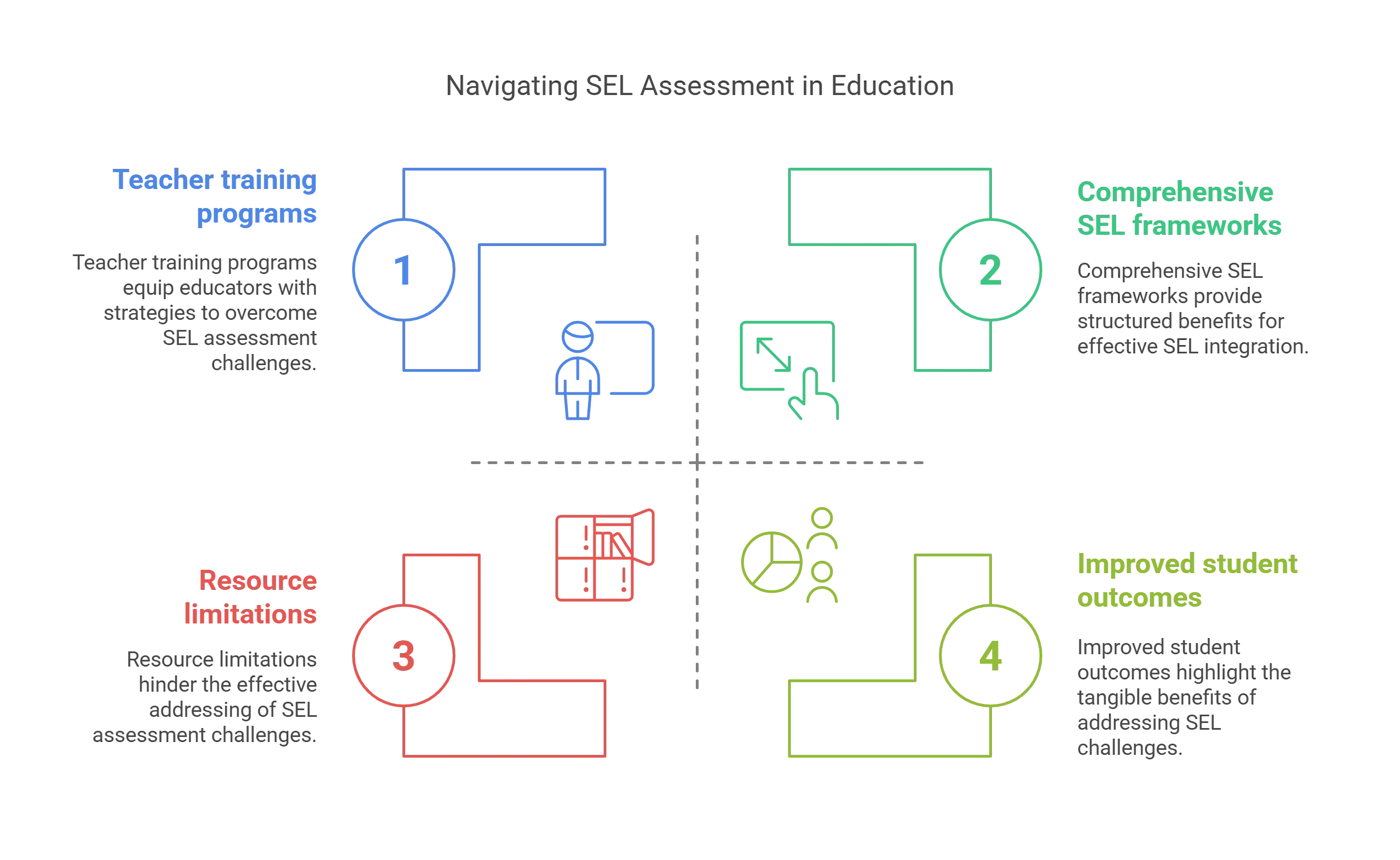
The Need for Assessing SEL in Education
Assessing SEL in education is essential for gaining insights into students’ emotional well-being, interpersonal skills, and overall growth.
It enables educators to customize interventions, provide targeted support, and create a nurturing learning environment conducive to students’ social and emotional development.
1. Benefits of Assessing SEL in Education
Assessing SEL allows educators to identify strengths, areas for growth, and individual needs, facilitating personalized support and encouraging a positive learning environment. Some of these benefits include:
- Personalized Interventions: Utilizing SEL enables educators to accurately identify individual student’s strengths, areas for growth, and specific needs. This personalized approach allows teachers to customize interventions and support strategies to address each student’s unique social and emotional requirements effectively.
- Creating a Nurturing Environment: Through SEL assessment, educators can cultivate a nurturing and supportive learning environment that promotes students’ emotional well-being and academic success.
- Enhanced Student Engagement: Assessing SEL helps educators understand students’ motivations, interests, and emotional triggers, leading to increased engagement in learning activities.
2. Challenges in Assessing SEL
SEL comes up with unique challenges that educators must address to ensure accurate and meaningful assessment outcomes that truly reflect students’ social and emotional competencies. Here are some of these challenges:
- Subjectivity: Evaluating emotions and interpersonal skills can be subjective.
- Lack of Standardized Tools: Limited availability of universally accepted digital assessment tools for SEL.
- Ongoing Evaluation: Continuous assessment is needed to track students’ progress effectively.
3. Addressing the Challenges: Strategies and Approaches
To overcome the challenges of assessing SEL, educators can implement various strategies to enhance the effectiveness and accuracy of SEL assessment practices.
- Utilizing Multiple Assessment Methods: Employing a diverse range of assessment methods, including self-reports, observations, and reflections, can provide a comprehensive view of students’ social and emotional competencies.
- Providing Training on SEL Assessment: Educating educators on effective assessment strategies.
- Encouraging a Culture of Emotional Intelligence: Promoting the importance of social and emotional skills within the educational environment promotes a culture of emotional intelligence among students, teachers, and staff.
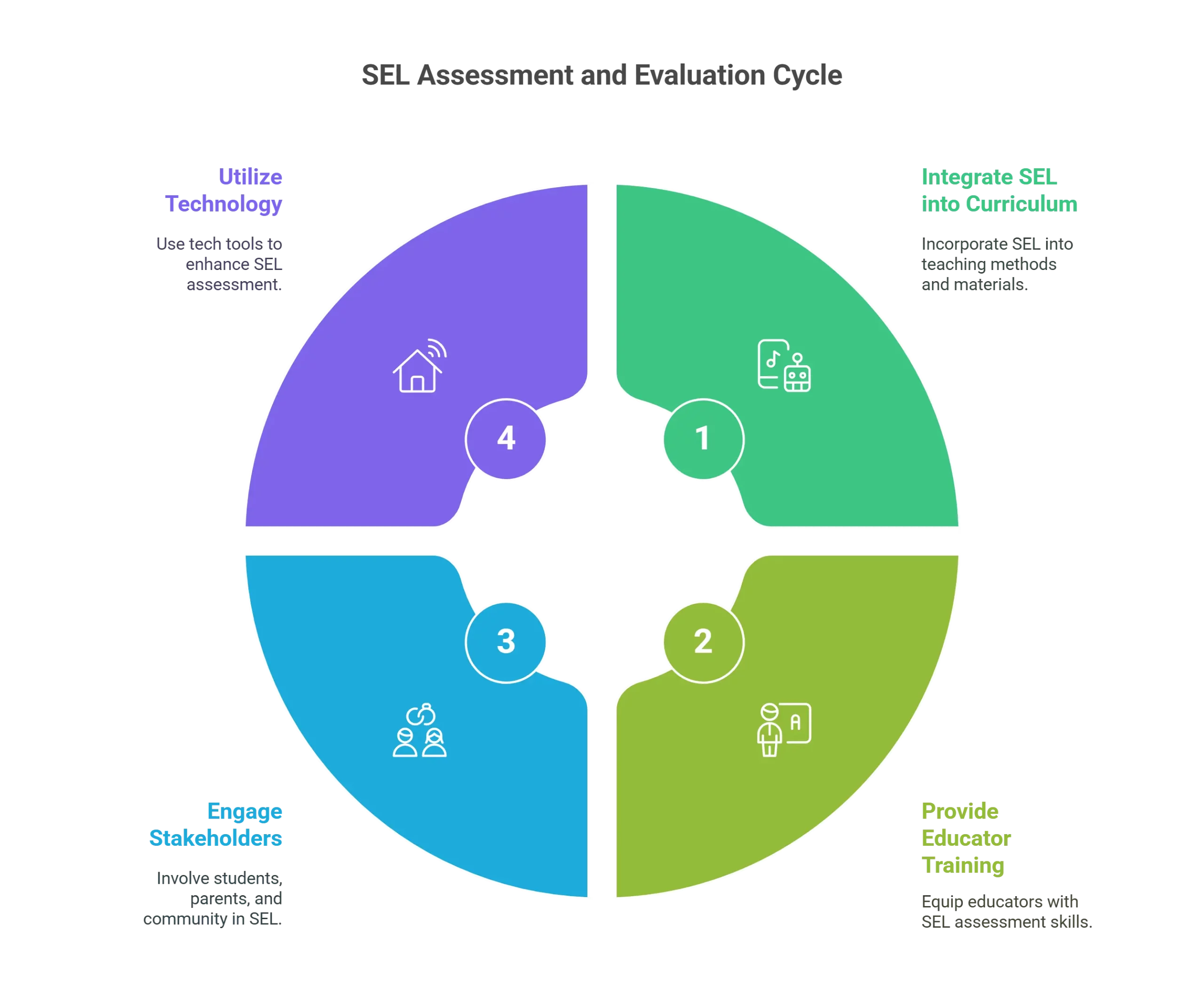
Implementing SEL Assessment and Evaluation
Implementing SEL assessment seamlessly into the curriculum enhances student growth and overall performance.
1. Integration into Curriculum and Instruction
Aligning assessment practices with instructional goals nurtures academic and social-emotional growth.
- Create a cohesive approach to nurturing academic and social-emotional growth.
- Ensure alignment of assessment practices with instructional objectives.
- Implant SEL assessment into daily learning experiences.
2. Professional Development for Educators
Equipping educators with SEL assessment skills is crucial for student support. It helps educators to:
- Focus on understanding SEL, interpreting data, and implementing interventions.
- Provide training on effective assessment practices.
- Empower teachers to support students comprehensively.
3. Engaging Stakeholders: Students, Parents, and Community
Involving stakeholders enables a collaborative approach to student development. It helps stakeholders:
- Nurture open communication and share assessment results with stakeholders.
- Seek input from students, parents, and the community.
- Create a supportive network reinforcing the importance of SEL.
4. Role of Technology in Facilitating Assessment and Evaluation
Technology streamlines SEL assessment processes and enhances effectiveness.
- Use technology for efficient data collection, analysis, and personalized feedback.
- Enhance scalability and effectiveness of SEL evaluation efforts.
- Integrate technology to streamline assessment processes.
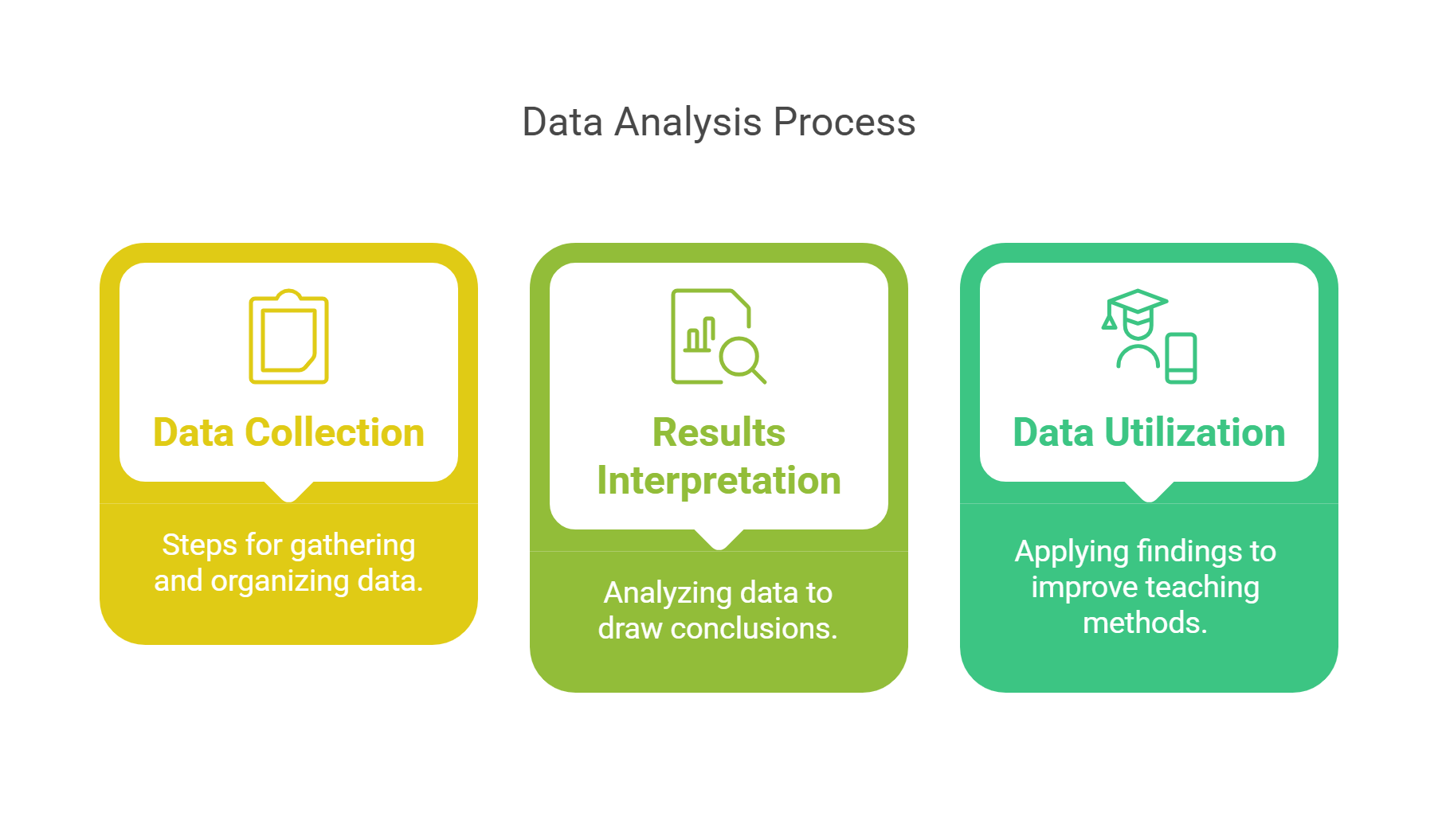
Analyzing and Interpreting SEL Data
Analyzing and interpreting social-emotional learning (SEL) data is critical in leveraging insights to guide interventions and support student growth effectively. Let’s delve deeper into the key aspects of analyzing and interpreting SEL data:
1. Data Collection and Management
Effective data collection involves diverse sources for informed decision-making.
- Gather data from surveys, observations, behavior logs, and student reflections.
- Organize data systematically to track progress over time.
- Identify trends and patterns for informed decision-making.
2. Interpreting Results
Analyze data to pinpoint strengths and areas needing development for customized interventions.
- Recognize patterns and individual needs to support holistic growth.
- Customize interventions based on individual student needs.
3. Utilizing Data to Inform Instruction and Interventions
Data-driven decision-making maximizes the impact of SEL initiatives on student outcomes.
- Design targeted interventions based on data insights.
- Adjust instructional strategies using evidence-based approaches.
- Encourage a supportive learning environment through data-driven decisions.
Conclusion
Assessing and evaluating social-emotional learning in education is not just about measuring outcomes; it’s about nurturing students. By embracing SEL assessment, educators empower students to thrive academically, socially, and emotionally. Institutions can cultivate a culture that values holistic student development through strategic implementation, ongoing evaluation, and collaborative engagement with stakeholders.
Hurix Digital can significantly contribute to social-emotional learning (SEL) assessment and evaluation by leveraging its expertise in curriculum development and educational content solutions. Our involvement can entail comprehensively examining existing curriculum programs to identify seamless opportunities for integrating SEL assessment components.
To know more, contact us today!

Senior Vice President – Business Development
Over 25 years of experience in the edtech and workforce learning industry with strong skills in Business Development, Customer Relationship Management (CRM) and Strategy.


